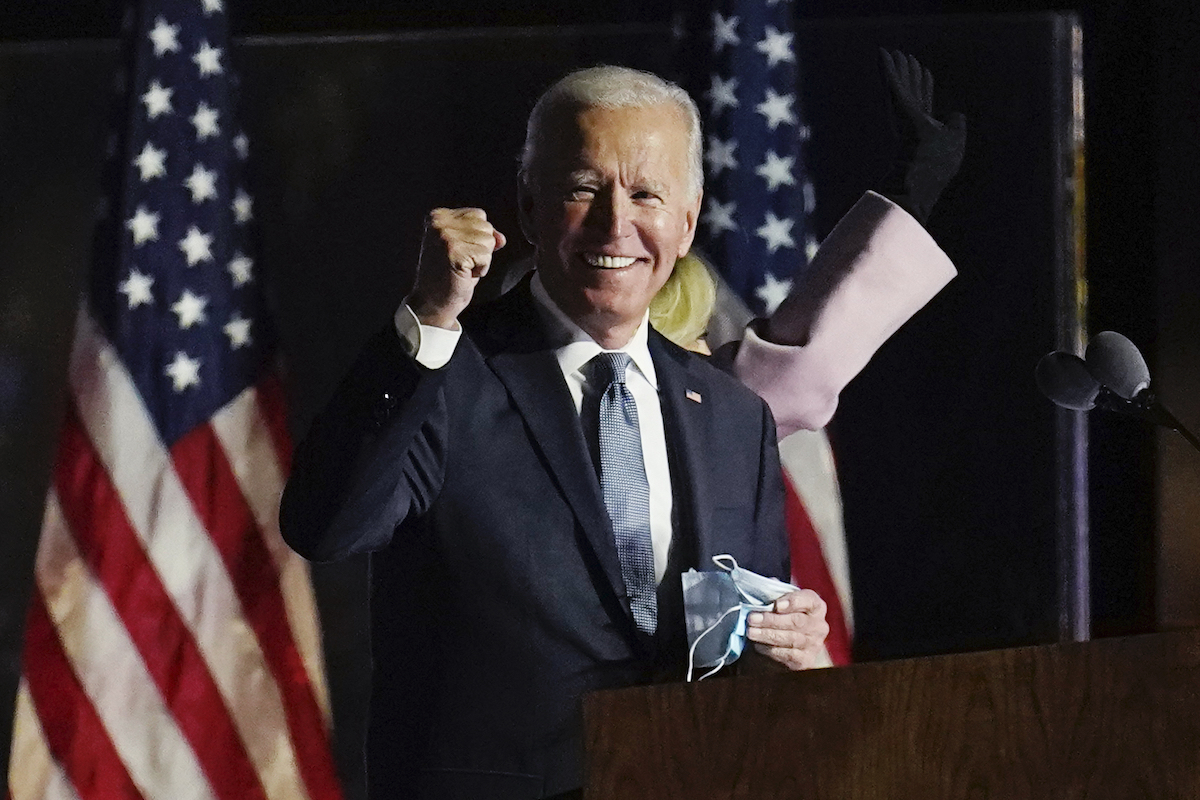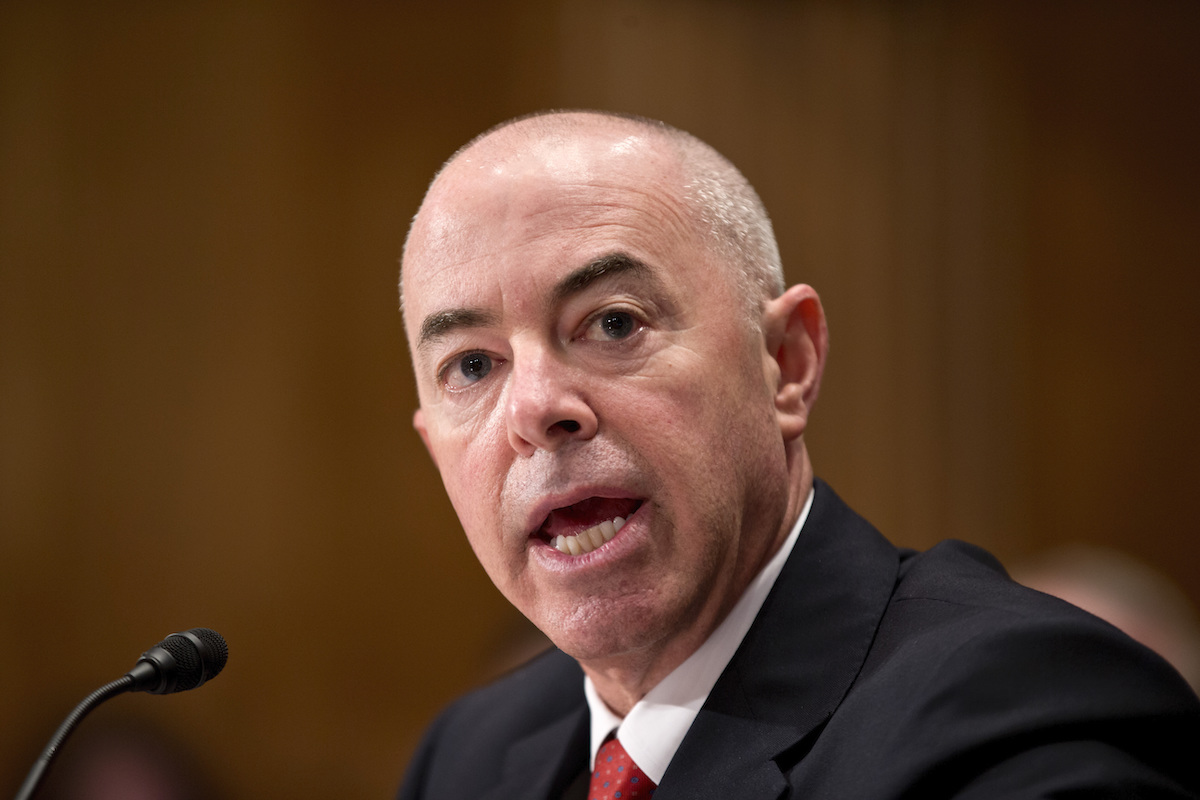

Democratic presidential candidate former Vice President Joe Biden speaks to supporters, early Wednesday, Nov. 4, 2020, in Wilmington, Del. (AP Photo/Paul Sancya)
Sigh. Here we go.
When president-elect Joe Biden immediately began appointing Obama administration members to official posts in an effort to tackle immigration, many of us took a step back. Unsure if there would be much difference between a Biden administration and an Obama administration. With so much focus on simply “rolling back” Trump’s policies, looking back to the Obama years is worrisome. Then, after Biden nominated the first Latino immigrant, who happens to be Cuban, to head the Department of Homeland Security (DHS), a whole new conversation began to take place.
Soon after his selection to head DHS, I defended Alejandro Mayorkas against some of the stereotypical assumptions made about him and his family. But when it comes to policy, he is going to be subjected to the same criticism as any other politician or government lapdog. Mayorkas is not above criticism and there will surely be enough to criticize Team Biden for.
Mayorkas was the head of the United States Citizenship and Immigration Services (USCIS) under Obama. Many argue, with valid reasoning, that it was his retooling of the agency that allowed the Trump administration to do much of what they did in mistreating asylum seekers, migrant workers, and undocumented immigrants. But on the flip side, Mayorkas was also instrumental in the implementation of Deferred Action for Childhood Arrivals (DACA).
Then my mind immediately goes back to “his retooling of USCIS is what opened the door for Trump to lead an attack on immigrants of color,” while hoping he intends to build on the good he did. Look, I don’t want to slam on everyone’s “Biden Won” weekslong virtual parade, but when it comes to Biden’s immigration policy, it lacks focus on some critical issues, glaring holes if you will. The lack of clear Latin American policy agenda stands out the most to me.
One final note about Mayorkas. While he has DHS experience on the immigration front, there are questions about whether he’s the right choice for the position considering what it takes to run DHS. From cyber-security to terrorism, his limited experience on many fronts has led to some rational debates about his qualifications as well.
Moving on.


In this July 25, 2013, file photo Alejandro Mayorkas testifies on Capitol Hill in Washington before the Senate Homeland Security and Governmental Affairs Committee hearing on his nomination. (AP Photo/J. Scott Applewhite)
Enough About Mayorkas
I think most would agree that the growing inhumanity towards asylum seekers is one of the most prominent bipartisan issues in our lifetime. There’s an overall lack of concern allowing for the U.S. government to slowly and methodically create policies leading us to where we are today. Simply rolling back Trump’s policies won’t be enough to correct the problems within the system. The issues that existed before Trump will still need to be addressed.
Joe Biden’s immigration policy ideas sound great on paper. And a lot of them are great. But they stop short of the much-needed system-wide reforms. If it feels like we’re back to the Bush years after 9/11, when DHS and the Immigration and Customs Enforcement agency (ICE) were born, you’re not alone. Bush’s policies were built on the emotions of the general public after the attacks. That era led Americans down a path to profound nationalism. That same nationalism produced new unfounded fears about immigrants at the southern border.
Biden’s Latino Agenda also sounds great on paper. It too has some glaring holes that must be addressed. While much of his policy is good for asylum seekers, immigrants already in the U.S., and underserved Latino communities, his plan to address the reasons behind why so many immigrants seek asylum in the U.S. is a troublesome gap in his administration’s ideas. Maintaining the same absolutist agenda that’s been in place for centuries is an issue.
Latin America is facing a migration-driven humanitarian crisis that the Council on Foreign Relations (CFR) points out is driven by “political repression, economic desperation, violence, and the effects of climate change.” According to CFR, over the last four years 4 million Venezuelans, 500,000 Colombians, and over a million Central Americans have been displaced internally—overwhelming the communities and countries that have taken them in.
The issues addressed by the CFR are noticeably absent from Biden’s policy agenda. This leads many to believe that his motivations in securing Latin America will be similar, if not identical, to the policies of previous administrations which have historically led to profound instability in many Latin American countries. Yes, even under Obama.
In 2009, the same year Obama assumed the presidency, Manuel Zelaya, the democratically elected president of Honduras, was ousted in a right-wing coup. A coup that was successful only because of the assurances of the Obama-Biden administration. Murders skyrocketed and Honduran security forces committed rape, murder, and many other waves of abuse with impunity—bolstered by the assistance of U.S. military and police aid.


2009 anti-Zelaya protesters (Roberto Brevé)
Meanwhile, life in post-coup Honduras has been centered around the privatization of resources, land grabs, and environmental devastation leading to a massive increase in poverty and the displacement of indigenous communities. This leads Hondurans and many other Latin Americans who were similarly victimized, to attempt migrating towards potential economic safety in the U.S.
Despite supporting the coup, in 2014 when Central Americans —along with thousands of unaccompanied minors (largely from Honduras)— turned up on the U.S. border seeking asylum, Biden echoed the words of previous presidents in the New York Times. He declared the presence of asylum seekers a “dangerous surge in migration,” leaving out the part about the corporate-backed interests of U.S. policy-makers creating the displacement of millions.
Tangible Fears
If there is no difference between a Joe Biden or a Barack Obama or any other president in U.S. history regarding Latin America, then why should we believe that the corporate-backed policy the United States presents will change? Every administration uses “corruption,” the “war on drugs” and military and police aid to displace millions when they don’t like a leader or an elected style of governing just so the Elon Musks of the world can get their hands on resources (see: Bolivia and its Lithium reserves).
It’s an overt anti-Indigenous, colonialist agenda. It’s white supremacy.
Meanwhile, Biden continues to argue that “the economies of El Salvador, Guatemala, and Honduras remain bogged down as the rest of the Americas surge forward. Inadequate education, institutional corruption, rampant crime, and a lack of investment are holding these countries back.” Again, never mentioning that the U.S. was in part responsible for all of it. The United States’ repression of governments in Latin America will continue until the entire region adopts the same failed capitalist ideals that the U.S. was founded on.
The U.S. balks at socialist governments while consistently proving capitalism can’t function without socialist policies for corporations and the wealthiest people—via tax breaks and legal protections. It comes at the expense of those that fund those programs through an expansive and nearly impossible to understand tax system that robs the poor and destroys any semblance of a middle class.
Unless Biden had some magical moment of clarity, an epiphany so to speak, we can expect more of the same with regards to Latin American policy. His administration, like Obama’s, like Trump’s, can argue that they are tackling corruption and fighting the drug war until they’re blue in the face. The reality is that the corruption impacting the entire Western Hemisphere starts right here in the U.S. and it’s all based on the corporate interests of American wealth.
Are we better off voting Trump out of office? Sure. But only in a very limited sense regarding Latin America. Voters ousted a hatemonger and racist who was promoting violence against people of color and was treating asylum seekers in the most inhumane way possible. To that, I say, good riddance. But is that enough?
While removing Trump may make us feel a little safer and cozier here at home, when it comes to Latin America, Trump’s neglect in the region leaves Biden in a position to take corrective measures or keep us operating under the imperialist nature of lobbyists and policy hawks here in the U.S. His policy agenda so far indicates we should expect the latter.
Back to Immigration
Biden’s plan for immigration is promising. Politically it’s ambitious, and accomplishing any of it would be welcomed by many. We can’t expect too much without tangible policies that address the myriad issues in Latin America largely caused by the absolutist U.S. policy agenda. The status quo means the immigration system will continue to be strained leading to more funding and the cycle will simply continue.
The “Biden Plan for Securing our Values as a Nation of Immigrants” is long and rather wordy. It leaves much to be desired in the realm of addressing the underlying issues that cause massive numbers of immigrants to seek asylum here in the U.S. While we intervene in nearly every aspect of Central and South American life with pledges of a better future we owe those Latin Americans the better life we promised.


In this Nov. 12, 2019, file photo people rally outside the Supreme Court as oral arguments are heard in the case of President Trump’s decision to end the Obama-era, Deferred Action for Childhood Arrivals program (DACA), at the Supreme Court in Washington. (AP Photo/Jacquelyn Martin, File)
For the U.S., Latin American legal policy revolves around supporting democratically elected governments. Meanwhile, the U.S. backs coups duly elected leaders. Many are Indigenous leaders, who may support “socialist policies” that bring people out of poverty, and/or don’t give in to corporate interests. Who refuse to give U.S. interests control over infrastructure, education, resources, or the wealth that comes from their national resources.
Instead, we see the U.S. promote sanctions and blockades against governments deemed unfit for partnership. Then, people can sit back and say, “See? Their government doesn’t work!” and use it as justification to force American idealism on its Southern neighbors. It’s not about supporting countries that uphold democracy. If it were Obama would have cut funding to Honduras after the coup in 2009. It’s about appeasing corporate interests and keeping colonialism at the forefront of every decision.
I’m hopeful that Biden makes a course correction here, but I’m apprehensive. I’ll be paying close attention to how his administration tackles Latin America and I’m fully prepared to take on the backlash like we had to when we criticized Obama’s policies. I’m here for it.
***
Arturo Domínguez is an anti-racist political nerd and founder of The Antagonist Magazine. He is an upcoming author, journalist, advocate for social justice, and a married father of three. He is a top writer on Medium and a regular contributor to several media outlets. He writes educational and informative material about systemic racism, white supremacy, and racial injustice. Twitter: @ExtremeArturo.



most American citizens don’t want large numbers of asylum seekers to be allowed to stay. most don’t want open borders. these are facts.
potential economic safety in the US. we don’t have jobs for all these people. so we should just take financial care of everyone??? smh
[…] affiliation. Naturally, we’re going to call out Joe Biden as well. Especially since he initially missed the mark in so many ways. This does not make me a Republican. This does not warrant a reminder of the death […]